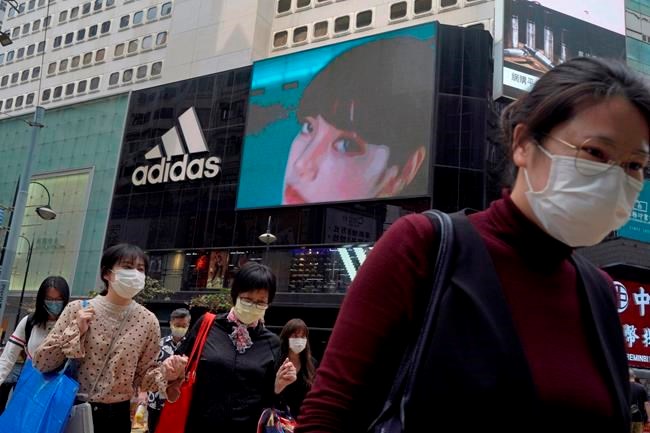BEIJING — China stepped up pressure Monday on foreign shoe and clothing brands to reject reports of abuses in Xinjiang, telling companies that are targeted by Beijing for boycotts to look more closely and pointing to a statement by one that it found no forced
H&M, Nike, Adidas and other brands are caught in a conflict over Xinjiang after Western governments imposed sanctions on officials accused of abuses. State media called for a boycott of H&M for saying it would no longer use cotton from Xinjiang and are criticizing other brands for expressing concern about reports of forced
“When the stick of sanctions is brandished on Xinjiang, it will also hit your own head,” a spokesman for the Xinjiang regional government, Xu Guixiang, said at a news conference in Beijing.
More than 1 million members of the Uyghur and other predominantly Muslim ethnic minorities have been confined to camps in Xinjiang in China's northwest, according to foreign governments and researchers. Authorities there are accused of imposing forced
The Chinese government rejects complaints of abuses and says the camps are for job training to support economic development and combat Islamic radicalism.
H&M should “look into this matter seriously,” Xu said.
“Where did you get this evidence? That would be some fake scholars or distorted reports or so-called testimonies,” Xu said. “Many of these people are ill-intentioned. They just want to destabilize Xinjiang.”
Separately, a foreign ministry spokesman warned Japan, which has been silent about Xinjiang, against joining Western governments in imposing sanctions.
“We hope Japan will be prudent with its words and deeds and not follow the United States in making unwarranted attacks on China only because it is a U.S. ally," Zhao Lijian said in a response to a question at a ministry briefing. “It does not serve of the interest of Japan.”
The attacks began when the ruling party’s Youth League publicized H&M’s statement last Wednesday. State TV called for a boycott of the Swedish retailer. Official media have criticized Nike, Adidas, Uniqlo and Burberry for expressing concern about reports of forced
That came after United States, the 27-nation European Union, Britain and Canada on March 22 announced travel and financial sanctions on four Chinese officials accused of abuses. Beijing has retaliated by announcing similar penalties against European and British officials, legislators and researchers.
H&M goods have disappeared from major Chinese e-commerce platforms but on Monday the other brands still were available. The smartphone apps for H&M, Adidas and Nike were missing Monday from major Chinese app stores.
The Communist Party often pressures foreign clothing, travel and other brands over actions by their governments or to compel them to adopt its positions on Taiwan, Tibet and other sensitive issues.
Most comply because China is one of the biggest, fastest-growing markets for global fashion, electronics and other consumer brands.
Another spokesman at the event with Xu, Elijan Anayat, pointed to a statement by shoe brand Skechers USA, Inc., that it failed to find evidence to support a report by an Australian
The supplier, Dong Guan Lu Zhou Shoes, confirmed some of its workforce are Uyghurs but said they are free to leave, according to Skechers. It said the company has conducted multiple audits of the supplier since 2017 and has “no reason to believe that Lu Zhou is using any forced
“I believe they will be appreciated by Chinese customers and win greater (market) shares,” Elijan Anayat said.
H&M’s statement last March cited a decision by the Better Cotton Initiative, an industry group that promotes
Japanese retailer MUJI and South Korean-owned athletic shoe maker FILA say will keep buying cotton from Xinjiang. FILA China said last week it started the process of withdrawing from the BCI.
Emily Wang Fujiyama, The Associated Press



